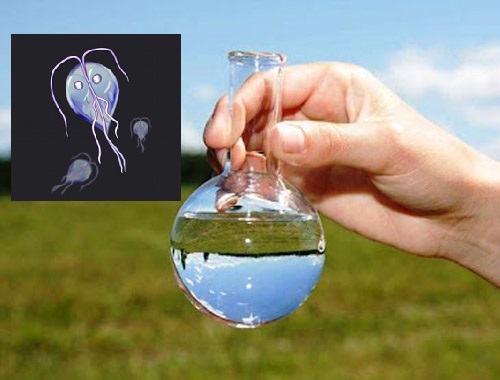Giardia, Giardiasis

Published: 18 Jun 2025
ICD9: 007.1 ICD10: A07.1 ICD11: 1A31
Let's break down "Giardia" and "Giardiasis":
![]() Giardia: This is a microscopic parasite.
Giardia: This is a microscopic parasite.
There are different species of Giardia, but the one most commonly infecting humans is *Giardia intestinalis* (also sometimes called *Giardia lamblia* or *Giardia duodenalis*).
![]() Giardiasis: This is the illness caused by a Giardia infection. It's an intestinal infection, meaning it affects the small intestine.
Giardiasis: This is the illness caused by a Giardia infection. It's an intestinal infection, meaning it affects the small intestine.
In simple terms: Giardia is the bug, and giardiasis is the disease you get when the bug infects you.
Key Points about Giardiasis:
![]() Cause: Infection with the *Giardia* parasite.
Cause: Infection with the *Giardia* parasite.
![]() Transmission: Giardia is spread through the fecal-oral route. This means it gets into your body when you ingest something (food, water, or objects) contaminated with feces (poop) containing the parasite.
Transmission: Giardia is spread through the fecal-oral route. This means it gets into your body when you ingest something (food, water, or objects) contaminated with feces (poop) containing the parasite.![]()

![]() Common ways this happens:
Common ways this happens:![]()

![]() Drinking contaminated water (especially untreated water from lakes, rivers, or streams).
Drinking contaminated water (especially untreated water from lakes, rivers, or streams).![]()

![]() Eating contaminated food (especially if handled by someone with the infection who didn't wash their hands).
Eating contaminated food (especially if handled by someone with the infection who didn't wash their hands).![]()

![]() Person-to-person spread (e.g., in daycare centers or among family members).
Person-to-person spread (e.g., in daycare centers or among family members).![]()

![]() Contact with animals that carry Giardia (though the species that infect animals aren't always the same ones that infect humans).
Contact with animals that carry Giardia (though the species that infect animals aren't always the same ones that infect humans).![]()

![]() Swallowing contaminated water while swimming in pools, hot tubs, or lakes.
Swallowing contaminated water while swimming in pools, hot tubs, or lakes.
![]() Symptoms:
Symptoms:![]()

![]() Diarrhea (often watery and greasy)
Diarrhea (often watery and greasy)![]()

![]() Gas (flatulence)
Gas (flatulence)![]()

![]() Stomach cramps
Stomach cramps![]()

![]() Nausea
Nausea![]()

![]() Vomiting
Vomiting![]()

![]() Dehydration
Dehydration![]()

![]() Loss of appetite
Loss of appetite![]()

![]() Weight loss
Weight loss![]()

![]() Sometimes, there are no symptoms at all (asymptomatic infection)
Sometimes, there are no symptoms at all (asymptomatic infection)
![]() Diagnosis: A stool sample is tested to look for Giardia parasites or Giardia antigens (proteins from the parasite). Multiple stool samples may be needed to increase the chance of detection.
Diagnosis: A stool sample is tested to look for Giardia parasites or Giardia antigens (proteins from the parasite). Multiple stool samples may be needed to increase the chance of detection.
![]() Treatment: Giardiasis is usually treated with antibiotics (e.g., metronidazole, tinidazole, nitazoxanide). Rehydration is also important, especially if diarrhea is severe.
Treatment: Giardiasis is usually treated with antibiotics (e.g., metronidazole, tinidazole, nitazoxanide). Rehydration is also important, especially if diarrhea is severe.
![]() Prevention:
Prevention:![]()

![]() Good hygiene: Wash your hands thoroughly with soap and water, especially after using the toilet, changing diapers, and before preparing or eating food.
Good hygiene: Wash your hands thoroughly with soap and water, especially after using the toilet, changing diapers, and before preparing or eating food.![]()

![]() Safe water: Drink treated water (e.g., boiled, filtered, or disinfected). Avoid drinking untreated water from lakes, rivers, or streams.
Safe water: Drink treated water (e.g., boiled, filtered, or disinfected). Avoid drinking untreated water from lakes, rivers, or streams.![]()

![]() Safe food handling: Wash fruits and vegetables thoroughly.
Safe food handling: Wash fruits and vegetables thoroughly.![]()

![]() Avoid fecal-oral contact: Be careful about hygiene, especially when traveling or in situations where sanitation may be poor.
Avoid fecal-oral contact: Be careful about hygiene, especially when traveling or in situations where sanitation may be poor.
Who is at risk?
![]() People who drink untreated water from contaminated sources.
People who drink untreated water from contaminated sources.
![]() Travelers to areas with poor sanitation.
Travelers to areas with poor sanitation.
![]() People in close contact with infected individuals (e.g., family members, daycare attendees).
People in close contact with infected individuals (e.g., family members, daycare attendees).
![]() Backpackers and campers who drink untreated water.
Backpackers and campers who drink untreated water.
![]() People who have oral-anal sexual contact.
People who have oral-anal sexual contact.
![]() People with weakened immune systems.
People with weakened immune systems.
Important Note: If you think you might have giardiasis, see a doctor for diagnosis and treatment. Don't self-treat.